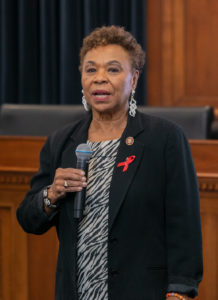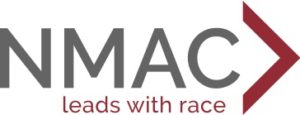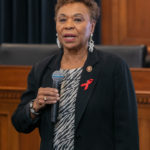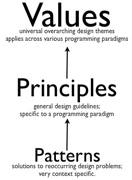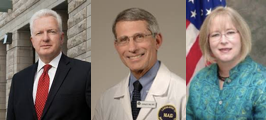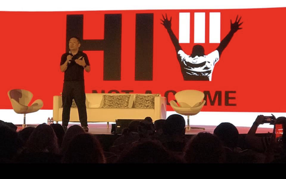NMAC has been awarded a cooperative agreement from the Health Resources and Services Administration (HRSA) to launch “ELEVATE” (Engage Leadership through Employment, Validation, and Advancing Transformation & Equity) for People Living with HIV.
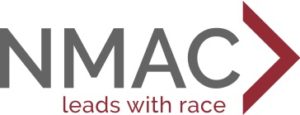 “ELEVATE” will be a four-year national training program for people living with HIV (PLHIV) integrating five of HRSA’s community programs. ELEVATE will prepare PLHIV within planning bodies, advocacy actions, and the HIV workforce to be meaningfully engaged and central to decision-making. PLHIV will be supported to earn leadership roles. The program will focus on residents of the 57 jurisdictions identified in the federal plan to End the HIV Epidemic. NMAC will operate “ELEVATE” in partnership with JSI Research & Training Institute, Inc., The Association of Nurses in AIDS Care, and the Latino Commission on AIDS.
“ELEVATE” will be a four-year national training program for people living with HIV (PLHIV) integrating five of HRSA’s community programs. ELEVATE will prepare PLHIV within planning bodies, advocacy actions, and the HIV workforce to be meaningfully engaged and central to decision-making. PLHIV will be supported to earn leadership roles. The program will focus on residents of the 57 jurisdictions identified in the federal plan to End the HIV Epidemic. NMAC will operate “ELEVATE” in partnership with JSI Research & Training Institute, Inc., The Association of Nurses in AIDS Care, and the Latino Commission on AIDS.
“From the moment the federal plan was announced, NMAC has believed that it could be a tremendous opportunity to hire people from affected communities into professional positions,” said NMAC Executive Director Paul Kawata. “‘ELEVATE’ will help make that opportunity into reality by giving potential job candidates the tools they need to be hired and succeed. We look forward to working with our constituents to help them make a difference in their communities.”
“We cannot say it enough times that meaningful engagement of people living with HIV is mandatory if we truly are committed to ending the epidemic,” said Ace Robinson, Director of the NMAC’s Center to End the Epidemics. “The vast majority of people living with HIV are racial/ethnic minorities who face a myriad of systemic societal ills in addition to HIV-related stigma. We must uplift these individuals by centering them on creating and implementing solutions. ELEVATE will help us all reach our common goal of ending the HIV epidemic.”
“ELEVATE” is modeled on NMAC’s Building Leaders of Color (BLOC) program and other training programs sponsored by HRSA including: JSI’s “Community HIV/AIDS TA Training (Planning CHATT)” and “The ACE TA Center’s In It Together Initiative;” the Center for Quality Improvement and Innovation’ s “Training Consumers on Quality Plus;” and Boston University School of Social Work’s “Improving Access to Care: Using Community Health Workers to Improve Linkage and Retention in Care (Among People of Color).”
“JSI is excited to build on our work designing and implementing Planning CHATT, as well as the ACE TA Center’s In It Together initiative, to continue to elevate community voices and enhance community members’ ability to take an active role in health care access and planning,” said Mira Levinson, Co-Director, Center for HIV & Infectious Diseases at JSI Research & Training Institute, Inc. “Our team is looking forward to applying our experience, passion, and commitment to health literacy to the continued evolution of these training resources.”
Engaging the HIV workforce to ensure that PLHIV are supported as both colleagues and patients will be central to the success of ELEVATE.
“The Association of Nurses in AIDS Care (ANAC) is looking forward to being a partner in the ELEVATE program, an important contribution to the success of the Plan to End HIV in the US,” said Carole Treston, Executive Director of the Association of Nurses in AIDS Care. “The engagement and leadership of PLWHIV in the HIV workforce is critical to ending the epidemic and nurses have an important role in supporting their training and employment. We are proud to be part of this cooperative agreement led by NMAC and HRSA, along with JSI and Latino Commission on AIDS.”
NMAC leads with race to urgently fight for health equity and racial justice to end the HIV epidemic in America. Since 1987, NMAC has advanced our mission through a variety of programs and services, including: a public policy education program, national and regional training conferences, a treatment and research program, numerous electronic and print materials, and a website: www.nmac.org. NMAC also serves as an association of AIDS service organizations, providing valuable information to community-based organizations, hospitals, clinics, and other groups assisting individuals and families affected by the HIV epidemic.
###
 NMAC applauds today’s passage of the Equality Act by the U.S. House of Representatives. Protection from discrimination for LGBTQ Americans is a vital component in the success of the federal government’s plan to end the HIV epidemic by 2030.
NMAC applauds today’s passage of the Equality Act by the U.S. House of Representatives. Protection from discrimination for LGBTQ Americans is a vital component in the success of the federal government’s plan to end the HIV epidemic by 2030.